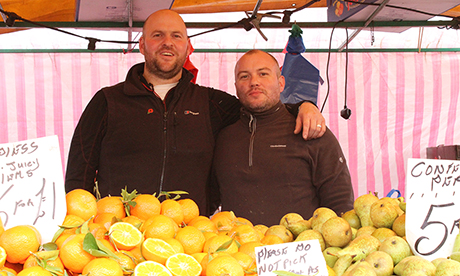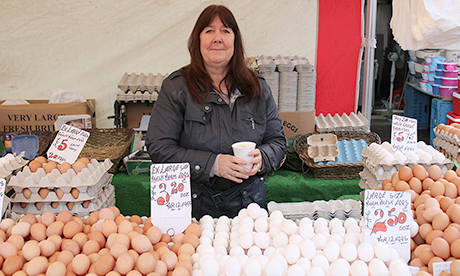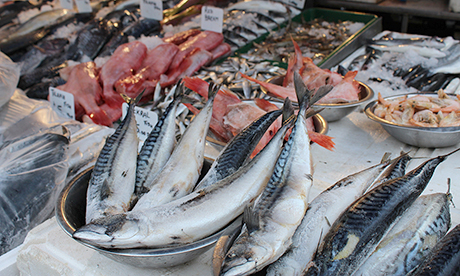Is this the end of Ridley Road Market as we know it?

Market economics: Matt Fawcett (L), Jason Julian (R) at their stall, Ridley Road Market. Photograph: Hackney Citizen
The smell of citrus wafts up from a display of halved oranges. A few stray raspberries squelch underfoot – the neighbouring stall is selling two punnets for a pound.
Cries of “Yes banana, lovely banana, get your banana” ring out in a Caribbean accent.
Standing at the entrance to Ridley Road Market it looks, superficially perhaps, like any other fruit and vegetable market.
But further down Ridley Road the full character of the market reveals itself.
One narrow stall brims with select Caribbean vegetables: yams, plantain, avocados, ginger and other unusual roots.
At the butchers, whole dead chickens hang head first above the counter. Below lie stacks of animal stomach and a pile of cow hooves.
Not all the produce might be to every shopper’s taste, but surely claims “you can buy everything here” are not all hyperbole.
And you really can – in 2012 several butchers were busted for selling cane rat meat.
Ridley Road Market started at the end of the 1880s with about 20 stalls. Today there are 180 pitches – though many are vacant – with a range of goods from all over the world.
How long the market may continue was called into question after Hackney Council at Christmas announced proposals to increase fees for the stallholders and businesses with shop fronts in Ridley Road.
Worried
The council plans to cut its current £180,000 annual subsidy to the borough’s markets and increase charges by up to £10 a day from April in a bid to make markets self-funding.
The fee hike will hit traders at Ridley Road the hardest.
“Of course we’re worried,” says stallholder Jason Julian from behind a mound of lemons. “It’s hard enough as it is.”
Julian, 39, has worked full time for his family’s business in Ridley Road since he was 15 years old.
“We’ve worked here all our lives. Some families have traded here for 120 years. We can’t do anything else. We haven’t got any qualifications. This is all we know.”

Sue Baldwin at her egg stall, Ridley Road Market. Photograph: Hackney Citizen
The council says its revised fees form part of an attempt to cope with the government’s £60 million cut to its budget.
Councillor Feryal Demirci, Cabinet Member for Neighbourhoods and Sustainability, said: “The council has for many years been subsidising its markets. However, against the backdrop of severe government funding cuts, this could no longer continue and we need to fairly balance the needs for all residents and businesses in the borough.
“We have a very strong track record of supporting and investing in our markets. Until 2011, the council had frozen the fees and charges for all markets for 16 years.”
Heavy management
Bill Parry-Davies, who runs OPEN Dalston, a heritage campaign group, said the council needs to take the market’s community value
into account.
“Not only is the market the heart of Dalston, it is an essential resource for affordable fresh food and other goods, and is a destination which attracts thousands of shoppers. All this benefits the wider Dalston economy.
“Hackney should look closely at how traders fees and charges are subsidising top heavy council management, rather than putting the market and traders’ livelihoods at risk.”
Ridley Road has historically served a diverse community. In the 1950s the clientele was reportedly largely Jewish.
Then when people started to move to the area from the Caribbean, the customers and produce began to change.
In 1970s a young businessman, Alan Sugar, rented a couple of floors at 89 Ridley Road – almost exactly in the middle of the market, from which he sold audio equiptment. He had a family connection to the street as his mother used to do her shopping there. Now the market sells Eastern European, Mediterranean and halal produce too.
Isabel Anaman, 58, lives in Leyton but travels to Ridley Road to shop for food. “Things are much cheaper here and you can get everything you need – food, vegetables, meat. It’s all good stuff,” she said. “I’ve been shopping here for over 10 years. I would be worried if some of the market were to close.”
Too high
Larry Julian is Chair of Ridley Road Traders’ Association and has worked in the market for 50 years. He is calling on the Town Hall to reduce the size of the fee hike.
“I understand the council can’t have the market working at such a great loss,” he said. “It has other priorities and is facing cutbacks.
“But it’s a 20 per cent increase in some cases, and that’s too high.”
The Hackney Citizen asked the council how it would safeguard the market in its current reform.
Cllr Demirci responded: “The accusations or suggestions that Hackney Council is deliberately running down Ridley Road Market are complete and utter nonsense.”
“We value Ridley Road Market, its heritage and the much loved essential service and jobs it provides to the local community.”
Luxury flats
Whether or not Ridley Road Market is being run down, the surrounding area is certainly being done up. Across Kingsland Road an imposing black fence advertises the FiftySevenEast development underway behind it. It reads: “1, 2 and 3 bed luxury apartments. Prices from £470,000.”
Developers are marketing the property as an “ideal” opportunity to investors. A 15 storey building will house 83 luxury apartments, and a separate five storey one will hold 15 “affordable intermediate” units.
“Most people in this market can’t even afford to shop in Sainsbury’s next door, let alone spend half a million pounds on a luxury flat,” says stall holder Jason Julian.
“That’s why they need to come to the market. What will a single mum do if this market closes – how is she going to afford the bus to shop elsewhere?”
Whittled away
Sadly the fee hike and regeneration of the area aren’t the only threats looming to Ridley Road.
The market would be disrupted by up to eight years of building works if plans to build an underground station in Dalston for Crossrail 2 go ahead.
Crossrail 2 is a proposed new railway line that would link Surrey to Hertfordshire via central London. The developers want to put their construction site on land between Ridley Road and Birkbeck Road – a spot stallholders currently use to store their goods.
“Losing storage would make it almost impossible to carry on,” says Sue Baldwin as she deftly packages up eggs, 30 to a tray. She has worked on and off for the family business in the market for 36 years.
“They don’t shut you down, they just whittle you away bit by bit. We’ve lost storage space, parking space and public toilets.”
Consultation for Crossrail 2 closed on 8 January and Ridley Road Traders Association made a representation.
Hackney Council has made clear its opposition to the current Crossrail 2 proposals. Cllr Demirci said: “The council has a great deal of concern about Transport for London’s proposals to construct a shaft in nearby Birkbeck Mews as part of its Crossrail 2 project.
“This could have a serious impact on the day-to-day running of Ridley Road Market, and we have made it clear we believe this is unacceptable.”

Mackerel for sale on Ridley Road, Photograph: Hackney Citizen
With the prospect of hiked fees, lost storage and ever more affluent developments, stallholders in Ridley Road must fight harder than ever for survival.
Before the stallholders used space in Birkbeck Road for storage, they used yards and sheds on the other side of Ridley Road, to the south.
But they were then shunted out in the late 1980s to make way for what is today the outdated Kingsland Shopping Centre.
A 1987 PR booklet advertising the development can be viewed at Hackney Archives.
It promised the scheme would herald “the renaissance of Dalston”, adding that “uses the classical proportions and materials of the Italian renaissance to create and air of lighthearted sophistication” and the “feeling of a delightful outdoor courtyard.” Beware such promises!
Now on the former storage site stands a large Sainsbury’s supermarket, where one punnet of raspberries can be purchased for £2 – four times the price of those in Ridley Road.
